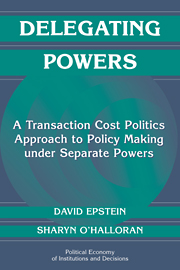Book contents
- Frontmatter
- Contents
- List of Figures and Tables
- Preface
- 1 PATHS OF POLICY MAKING
- 2 CHOOSING HOW TO DECIDE
- 3 TRANSACTION COST POLITICS
- 4 THE DECISION TO DELEGATE
- 5 DATA AND POSTWAR TRENDS
- 6 DELEGATION AND CONGRESSIONAL-EXECUTIVE RELATIONS
- 7 DELEGATION AND LEGISLATIVE ORGANIZATION
- 8 DELEGATION AND ISSUE AREAS
- 9 CONCLUSION
- AN AFTERWORD ON COMPARATIVE INSTITUTIONS
- APPENDICES
- References
- Index
- Titles in the series
3 - TRANSACTION COST POLITICS
Published online by Cambridge University Press: 02 December 2009
- Frontmatter
- Contents
- List of Figures and Tables
- Preface
- 1 PATHS OF POLICY MAKING
- 2 CHOOSING HOW TO DECIDE
- 3 TRANSACTION COST POLITICS
- 4 THE DECISION TO DELEGATE
- 5 DATA AND POSTWAR TRENDS
- 6 DELEGATION AND CONGRESSIONAL-EXECUTIVE RELATIONS
- 7 DELEGATION AND LEGISLATIVE ORGANIZATION
- 8 DELEGATION AND ISSUE AREAS
- 9 CONCLUSION
- AN AFTERWORD ON COMPARATIVE INSTITUTIONS
- APPENDICES
- References
- Index
- Titles in the series
Summary
Without some knowledge of what would be achieved with alternative institutional arrangements, it is impossible to choose sensibly among them.
Ronald Coase, The Firm, The Market, and The LawOur view of legislative–executive relations, similar to the studies cited in Chapter 2, attempts to motivate delegation from the ground up as a rational institutional choice made by utility-maximizing legislators. In constructing our framework, we draw an analogy with recent insights from the economic theory of the firm. Particularly of interest is work on the subject of transaction cost economics and vertical integration – that is, a firm's make-or-buy decision. We argue that Congress has a similar make-or-buy decision when making public policy; it can specify the details of legislation itself or it can subcontract them to executive agencies. Furthermore, the central concepts of transaction cost economics can help us construct a theory of political delegation, so that we can make predictions about the location of policy making in a separation of powers system.
Our objective in this exercise is not simply to impose transaction cost analysis on a political context but to use its key notions as organizing principles. In particular, the concepts of boundaries, incomplete contracts, and the holdup problem shed new light on issues of legislative organization and congressional–executive relations. The committee system and delegation both have their strengths and weaknesses, and the transaction costs associated with policy production in either mode will vary from case to case.
- Type
- Chapter
- Information
- Delegating PowersA Transaction Cost Politics Approach to Policy Making under Separate Powers, pp. 34 - 51Publisher: Cambridge University PressPrint publication year: 1999

